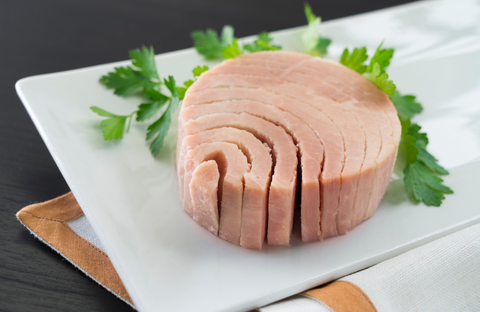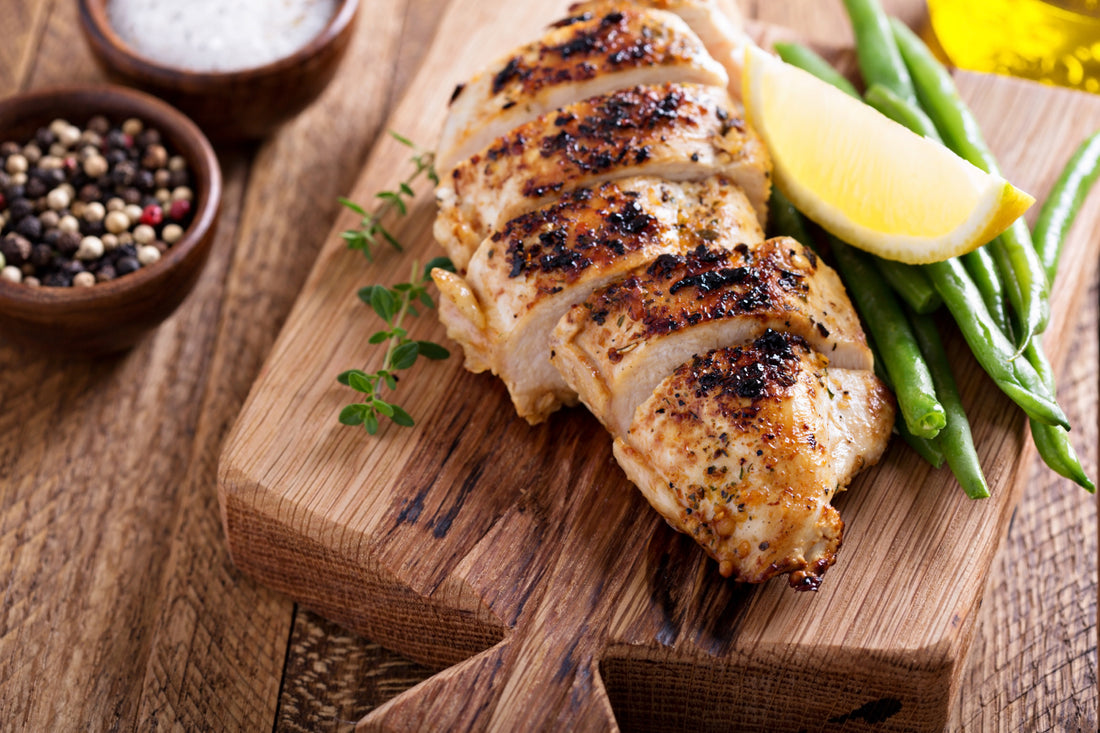Many of us know we need to consume protein in our diets, but we might not be doing it correctly. Getting enough protein is important, but the types of protein that we get matter just as much. By understanding the benefits of complete proteins and how they fit into our diets, we can be more mindful about including them in our daily nutrition and supporting our overall health.
Fortunately, there is a long list of food options we can consume when trying to incorporate more complete proteins.
What Is a Complete Protein?
There are 20 different amino acids that serve as the building blocks of protein. Of these 20 amino acids, the body can produce 11 of them itself. However, the remaining nine amino acids cannot be created by the body, meaning we need to get them through the foods we eat.
Because of this necessity, there are nine amino acids known as “essential” amino acids. A complete protein is a food that contains all nine of these amino acids — the nine essential amino acids are:
- Histidine
- Leucine
- Isoleucine
- Lysine
- Methionine
- Phenylalanine
- Threonine
- Tryptophan
- Valine
Why Do Complete Proteins Matter?
Protein is one of the most essential nutrients we can obtain because it serves as one of the vital building blocks for life. Protein is found in every cell in the body, supporting our bones, muscles, and skin, meaning we cannot afford to miss out on it.
As a foundational component of cells, protein is crucial for helping our bodies repair damaged cells and create new ones. These functions are crucial for muscle growth, childhood development, and injury recovery.
Complete proteins are vital for ensuring that our bodies can use the protein we eat. After all, you can’t build a house if you are only given some of the bricks. If the majority of the foods in our diet are incomplete proteins, then our bodies cannot synthesize the protein properly and put it to use for crucial functions like tissue growth and repair.
Which Foods Contain Complete Proteins?
Although they are not extremely abundant in every diet, especially plant-based diets, complete proteins are not difficult to find if you know where to look. The following are some of the best sources of complete protein.
1. Animal Proteins

If you are a meat eater, it is generally easy to obtain complete proteins. All animal-based foods are complete proteins, requiring little effort to determine how to include complete proteins in your diet. You can consume any of the following for a complete amino acid profile:
- Fish
- Beef
- Poultry
- Dairy
- Eggs
If you are on a plant-based diet, you will have to think a bit harder about how to include complete proteins in your diet.
2. Protein Powder
One of the most reliable forms of complete proteins is protein powder. After all, protein powder supplements are designed to help you get the most out of your protein. The careful formulation of these supplements often ensures that they have a complete profile of amino acids included from the start to support effective protein digestion.
Protein powder comes in many varieties, from animal-based whey protein isolate to plant-based options like pea protein. Thanks to the many options, it is easy to find a complete protein option that works for you and your diet.
3. Buckwheat
Buckwheat is an excellent complete protein. This whole grain has many potential health benefits as it is also a good source of fiber and healthy fats. Buckwheat is also a perfect go-to option for people who have a gluten intolerance since it is entirely gluten-free. One cup of buckwheat has an incredible 22.4 grams of protein.
4. Quinoa
Quinoa is one of the best plant-based proteins you can find, as it contains a complete amino acid profile on its own. This grain offers more protein than any other grain, often giving it the reputation of a “superfood.” One cup of quinoa provides 24 grams of complete protein.
Quinoa also offers notable amounts of iron, fiber, and calcium. The superfood is easy to enjoy as a side dish to your dinner and also makes an excellent replacement for rice when you want to boost your protein intake.
5. Soybeans

Soy is the go-to option for protein for those on a plant-based diet, and rightfully so. Whether you want to build muscle or support healthy growth and development, soy is a more-than-reliable plant-based protein. Soy is also an impressive source of calcium, fiber, and antioxidants.
You can add soybeans into your diet in a variety of ways, like drinking soymilk, snacking on edamame, or adding tofu to your soup. Just 100 grams of tofu can provide as much as 10 grams of protein, while a cup of soymilk can provide 7 grams of protein.
6. Hemp Seeds
One of the most nutrient-rich seeds you can find, hemp seeds are also a complete protein. Hemp seeds also contain an impressive amount of protein. Just three tablespoons of hemp seeds provide almost 10 full grams of protein.
These seeds are also a great addition to any diet thanks to their high concentration of other nutrients. In addition to protein, hemp seeds also provide ALA and omega-6 fatty acids on top of magnesium, calcium, vitamin E, and zinc.
Hemp seeds are easy to add to smoothies, oatmeal, and yogurt for an extra nutritional boost and a touch of complete protein.
7. Algae
Algae is an excellent plant-based source of complete protein. Although you probably haven’t heard much about this powerful marine plant yet, there are multiple types of algae that allow you to get the complete proteins you need. The most common protein-rich forms of algae are Spirulina and Chlorella. These forms of algae can add a modest amount of complete protein to a smoothie or juice. One tablespoon of Spirulina or Chlorella adds about four grams of protein.
Another key benefit of algae is its high omega-3 fatty acid content, which can help you maximize your protein intake even further. Consuming omega-3 fatty acids in your diet helps support muscle protein synthesis — this means that your body is able to properly turn protein into muscle. Omega-3s also help to support your bodily systems, from your heart to your brain.
Since eating fish is the most popular way to consume omega-3s, people on a plant-based diet are likely missing out. Like the nine types of amino acids, omega-3 fatty acids can’t be produced by the body on its own. Therefore, in the search for a diet that incorporates complete proteins, algae is the perfect addition.
Can You Benefit From Incomplete Proteins?
One of the criticisms of a plant-based diet is that there are fewer options for complete proteins. However, you do not need to eat just one food to obtain complete proteins. Pairing the right foods together in your diet helps to create complete proteins, which is excellent news for those on a plant-based or vegan diet.
You can pair the following types of incomplete proteins to form a complete amino acid profile:
- Whole grains with legumes
- Whole grains with nuts or seeds
- Legumes with nuts or seeds
Using this basic template, you can take advantage of a wide range of meal ideas. The following combinations are excellent options for anyone to incorporate more complete proteins into their diet:
- Peanut butter on whole-wheat bread
- Rice and beans
- Beans and tortillas
- Hummus and bread
- Lentils and rice
- A salad with chickpeas and sunflower seeds
Keep in mind that you do not have to eat these combinations at the same time and can consume them over the course of the day, making it even easier to get complete proteins than you think. For example, if you have whole grains for breakfast and legumes for lunch, you have already consumed all essential amino acids. To maximize your protein intake, you should try to incorporate a variety of these foods in your diet.
To learn more about how to incorporate the right amounts and right types of proteins in your diet, you should consult your doctor or a registered dietitian.
Make the Most of Your Protein
In crafting your diet, you should ensure that you get enough protein, but you should also make sure that you get complete proteins so that your body is able to make the most of the nutrients. Whether you are on a plant-based diet or have no dietary restrictions, there are several options for obtaining complete protein in your diet. By supplementing your protein intake with other nutrients, like omega-3s, you can see even more benefits.
At iwi life, we make it easy for you to get valuable algae-based omega-3s to support your protein intake. With our daily omega-3 supplement, you can get two of the most essential fatty acids in one convenient soft gel. Explore our omega-3 supplement for yourself to see all the potential health benefits that come with it.
Sources:
The Complete Protein Foods List And Facts | Piedmont Healthcare















